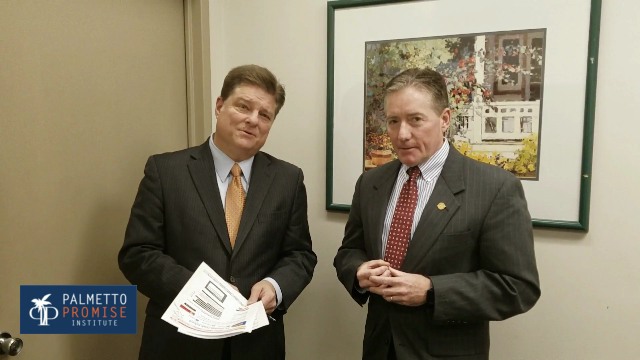Weekly Legislative Report – School Accountability
This week at Palmetto Promise Institute, Senior Fellow Dr. Oran Smith speaks with Sen. Greg Hembree (R-Horry) about South Carolina’s effort to hold Palmetto State schools accountable to parents and the public.
While Gov. Nikki Haley’s likely final State of the State address garnered big headlines, an equally significant meeting of the Education Oversight Committee flew under the radar this week. But why should the debate matter to you? We can explain:
Differing opinions about how to rate the quality of schools divides the Education Oversight Committee
Earlier this week at the SC Education Oversight Committee we were unexpectedly treated to a microcosm of the debate over education in America. The specific battle in this education war of sorts?
We have reported on this issue in this space before here and here. Oversimplifying a bit, Federal law (the ESSA) requires states to rate how well their schools are educating students, so the debate is hot–and relevant. When it comes to the great school report card debate, there are at least three camps:
- Those who favor letter assigning A-F letter grades to a school on a variety of categories as well as an overall (or “summative” in education-ese) grade from A-F (think GPA here)
- Those who oppose A-F entirely and any “summative” grades, desiring check marks or less straightforward categories such as “challenge schools”
- Those who are somewhere in between, favoring categorical and/or summative grades that are numerical (on a 0-100 scale for example) or the well-known “Excellent, Good, Fair, Poor”
Proponents of an A-F School Rating System Receive push-back from Opposing Viewpoints
The accountability and school report card issue is complicated, but Monday’s debate clearly became about A-F. Here are a number of anti-A-F statements made by EOC members worth your consideration. We provide no commentary other than italics:
On Professional Educators: “A-F is appropriate for assessing children, but it is insulting to professionals. [It] undercuts complexity.”
On Rights of Parents: “Parents should decipher school grades. Schools grades should not be simple, but discrete.”
On Accountability: “People don’t improve when you tell them they are crummy.”
“[Educators and students] believe what they read in the newspaper about their schools and take on the characteristics of those labels. [A-F] is a defeatist system.”
Overall: “We don’t want to be punitive.”
In the accompanying video, Senator Greg Hembree (R-Horry), Education Oversight Committee member and chair of the Senate Education K-12 subcommittee, takes on these objections.
The Education Oversight Subcommittee Advances a Proposal which is not A-F, but can be fixed
Below, is a sample of the School Performance grading recommendation adopted by the EOC subcommittee on Monday. Underneath it is a school report card from Oklahoma, one of 17 states that uses A-F letter grades for schools. (In fact, South Carolina and Kentucky are now the only states in the South who have not adopted the A-F scale for schools.)


The contrast is stark and begs the question, “Who we are designing report cards for in the first place?”
While the recommendation adopted by the EOC subcommittee might make perfect sense to an education administrator (although that could be debated), Oklahoma clearly gives parents and the public transparent and accessible information.
Let’s be clear, the accountability categories in the EOC recommendation are good. And there are reasonable systems that do not use the A-F scale. In fact, the EOC could go a long way in helping parents by modifying their recommendation to a 100 point scale.
The full Education Oversight Committee will meet this coming Tuesday, January 17 to vote on an accountability system.
Will they decide to empower parents and the public with useable information (A-F;0-100) or recommend a complicated system that disguises the truth about a school’s performance?
If you believe this issue is important to the future of education in South Carolina, let EOC members know what YOU think before they vote on Tuesday.






